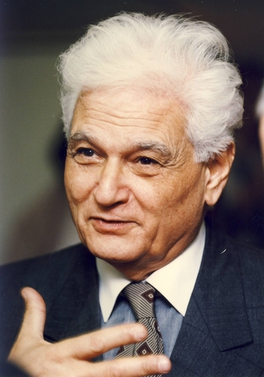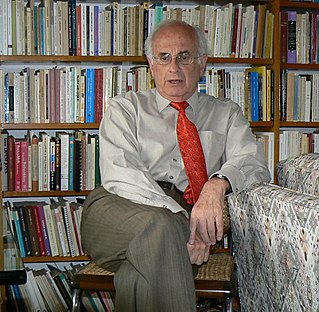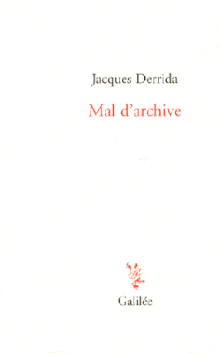
Jacques Marie Émile Lacan was a French psychoanalyst and psychiatrist. Described as "the most controversial psycho-analyst since Freud", Lacan gave yearly seminars in Paris, from 1953 to 1981, and published papers that were later collected in the book Écrits. Transcriptions of his seminars, given between 1954 and 1976, were also published. His work made a significant impact on continental philosophy and cultural theory in areas such as post-structuralism, critical theory, feminist theory and film theory, as well as on the practice of psychoanalysis itself.
Psychoanalysis is a set of theories and therapeutic techniques that deal in part with the unconscious mind, and which together form a method of treatment for mental disorders. The discipline was established in the early 1890s by Sigmund Freud, whose work stemmed partly from the clinical work of Josef Breuer and others. Freud developed and refined the theory and practice of psychoanalysis until his death in 1939. In an encyclopedic article, he identified the cornerstones of psychoanalysis as "the assumption that there are unconscious mental processes, the recognition of the theory of repression and resistance, the appreciation of the importance of sexuality and of the Oedipus complex." Freud's colleagues Alfred Adler and Carl Gustav Jung developed offshoots of psychoanalysis which they called individual psychology (Adler) and analytical psychology (Jung), although Freud himself wrote a number of criticisms of them and emphatically denied that they were forms of psychoanalysis. Psychoanalysis was later developed in different directions by neo-Freudian thinkers, such as Erich Fromm, Karen Horney, and Harry Stack Sullivan.

Sigmund Freud was an Austrian neurologist and the founder of psychoanalysis, a clinical method for evaluating and treating pathologies seen as originating from conflicts in the psyche, through dialogue between patient and psychoanalyst, and the distinctive theory of mind and human agency derived from it.
Psychoanalytic literary criticism is literary criticism or literary theory that, in method, concept, or form, is influenced by the tradition of psychoanalysis begun by Sigmund Freud.

Jacques Derrida was a French philosopher. He developed the philosophy of deconstruction, which he utilized in a number of his texts, and which was developed through close readings of the linguistics of Ferdinand de Saussure and Husserlian and Heideggerian phenomenology. He is one of the major figures associated with post-structuralism and postmodern philosophy although he distanced himself from post-structuralism and disowned the word "postmodernity".

Hélène Cixous is a French writer, playwright and literary critic. During her academic career, she was primarily associated with the Centre universitaire de Vincennes, which she co-founded in 1969 and where she created the first centre of women's studies at a European university. Known for her experimental writing style and great versatility as a writer and thinker, she has written more than seventy books dealing with multiple genres: theatre, literary and feminist theory, art criticism, autobiography and poetic fiction.

Delusion and Dream in Jensen's Gradiva is an essay written in 1907 by Sigmund Freud that subjects the novel Gradiva by Wilhelm Jensen, and especially its protagonist, to psychoanalysis.
Repression is a key concept of psychoanalysis, where it is understood as a defense mechanism that "ensures that what is unacceptable to the conscious mind, and would if recalled arouse anxiety, is prevented from entering into it." According to psychoanalytic theory, repression plays a major role in many mental illnesses, and in the psyche of the average person.
The following is a bibliography of works by Jacques Derrida.
Nicolas Abraham was a Hungarian-born French psychoanalyst best known for his work with Mária Török. The pair took a distinctive approach to psychoanalytic theory, holding that the use of preset notions may restrict an individual's motives in relation to the framework of their personal experiences.
"Structure, Sign, and Play in the Discourse of the Human Sciences" was a lecture presented at Johns Hopkins University on 21 October 1966 by philosopher Jacques Derrida. The lecture was then published in 1967 as chapter ten of Writing and Difference.
The Symbolic is the order in the unconscious that gives rise to subjectivity and bridges intersubjectivity between two subjects; an example is Jacques Lacan's idea of desire as the desire of the Other, maintained by the Symbolic's subjectification of the Other into speech. In the later psychoanalytic theory of Lacan, it is linked by the sinthome to the Imaginary and the Real.

Sarah Kofman was a French philosopher.
Memory work is a process of engaging with the past which has both an ethical and historical dimension. During memory work, the process of producing an image or what we refer to as the production of the imaginary, is central. Therefore, the key in the analysis of remembered history are contradictions. This calls for an expanded archive that includes the "oral and popular tradition" as well as the written traditions normally associated with the archives.

Élisabeth Roudinesco is a French scholar, historian and psychoanalyst. She conducts a seminar on the history of psychoanalysis at the École Normale Supérieure.

Néstor Alberto Braunstein was an Argentine-Mexican physician, psychiatrist and psychoanalyst.

Robert Rowland Smith is a British author and philosopher. His books include Derrida and Autobiography, Breakfast with Socrates: The Philosophy of Everyday Life, and AutoBioPhilosophy: An Intimate Story of What It Means to Be Human. He is a regular speaker at public and private events, addressing a wide range of topics that includes philosophy, psychology, politics, and art. Alongside his literary career, Smith works as a business adviser and practitioner of Systemic Family Constellations.
John Forrester was a British historian and philosopher of science and medicine. His main interests were in the history of the human sciences, in particular psychoanalysis and psychiatry.

Philosophical Essays on Freud is a 1982 anthology of articles about Sigmund Freud and psychoanalysis edited by the philosophers Richard Wollheim and James Hopkins. Published by Cambridge University Press, it includes an introduction from Hopkins and an essay from Wollheim, as well as selections from philosophers such as Ludwig Wittgenstein, Clark Glymour, Adam Morton, Stuart Hampshire, Brian O'Shaughnessy, Jean-Paul Sartre, Thomas Nagel, and Donald Davidson. The essays deal with philosophical questions raised by the work of Freud, including topics such as materialism, intentionality, and theories of the self's structure. They represent a range of different viewpoints, most of them from within the tradition of analytic philosophy. The book received a mixture of positive, mixed, and negative reviews. Commentators found the contributions included in the book to be of uneven value.










